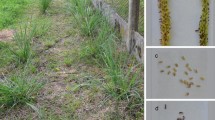Abstract
The common races of bahiagrass, Paspalum notatum, are tetraploid (2n=4x=40) and reproduce by aposporous apomixis. Paspalum notatum var. saurae is the corresponding diploid (2n=2x=20) sexual race that outbreeds due to self-incompatibility. Chromosome doubling was induced by colchicine treatments in three individual plants from a natural diploid population. Embryological studies demonstrated that one of the induced autotetraploid plants reproduced sexually. The other two autotetraploids were facultative apomicts. These results indicate that an unexpressed gene(s) for apomixis exists at the diploid level. The expression of the trait is ploidy-dependent. The ploidy dependency may act either on the locus controlling apomixis through some transcription factors or via a secondary locus which requires a higher allele dosage to affect the expression of the main locus.
Similar content being viewed by others
Author information
Authors and Affiliations
Additional information
Received: 24 October 2000 / Revision accepted: 13 February 2001
Rights and permissions
About this article
Cite this article
Quarin, C., Espinoza, F., Martinez, E. et al. A rise of ploidy level induces the expression of apomixis in Paspalum notatum. Sex Plant Reprod 13, 243–249 (2001). https://doi.org/10.1007/s004970100070
Issue Date:
DOI: https://doi.org/10.1007/s004970100070




